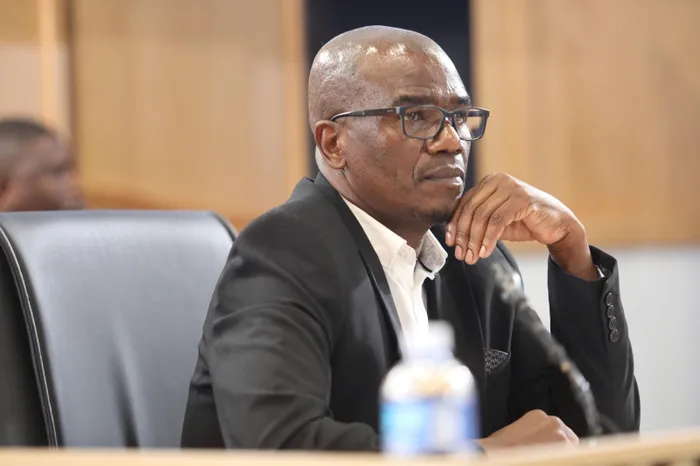
Captain Meldon Mkhatshwa, Senior Forensic Analyst (Ballistics) with the SAPS Forensic Science Laboratory in Pretoria, testified before the Madlanga Commission on Tuesday.
Image: Oupa Mokoena/Independent Newspapers
Captain Meldon Mkhatshwa informed the Madlanga Commission that the Political Killings Task Team (PKTT) was struggling and had become ineffective following the directive to disband issued by suspended Police Minister Senzo Mchunu late last year.
Mkhatshwa, a senior ballistic analyst at the SAPS Forensic Science Laboratory in Pretoria, testified on Tuesday that the team’s capacity to swiftly process critical evidence has been severely compromised since Mchunu’s directive came into effect on December 31, 2024.
While stressing that the PKTT had not been formally dissolved, Mkhatshwa said several of its key members, including himself, were sent home, disrupting the specialised coordination that once gave the task team its edge.
“PKTT lacks now the turnaround time of dealing with cases. They had everything in the palm of their hands,” Mkhatshwa said.
“When they arrest someone with a firearm, they send it to ballistics, and we produce a report within a day or two. They needed crime intelligence for evidence and cellphone analysts for downloads.
“They are no longer going to process this fast and be effective because part of the discipline is no longer part of them.”
The PKTT, established to investigate and curb the surge in attacks on police officers, had earned a reputation for its rapid interdepartmental coordination, particularly between ballistics, crime intelligence, and digital forensics.
But, according to Mkhatshwa, the disbandment directive fractured that synergy, leaving investigators without critical analytical support.
He said now, if there is a report that they need to deal with, it is sent to aManzimtoti which will again take a lot of time to be resolved.
Mchunu, who has since been placed on special leave, issued the order while National Police Commissioner General Fannie Masemola was on leave.
The minister later attempted to clarify his decision before Parliament’s ad hoc committee probing corruption within SAPS, insisting the move was intended as an “administrative restructuring.”
However, Mkhatshwa’s testimony painted a different picture, one of paralysis within a once-effective unit.
Meanwhile, Captain Solomon Modisane, an SAPS ballistics expert also said that while SAPS took about 30 days to complete a ballistics analysis, the PKTT did the same work in just three days, maximum.
Modisane said members of the PKTT were known for their relentless work ethic.
“We will work until it’s late,” he said.
The commission will continue on Wednesday with the new witness expected to give details on the arrest of notorious businessman, Katiso “KT” Molefe.
kamogelo.moichela@iol.co.za
IOL Politics